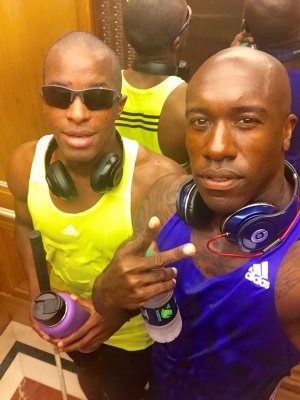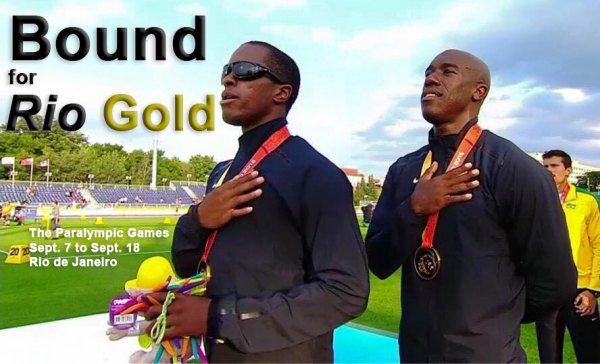Former LHS track star 'guides' blind sprinter to Paralympic Gold in Rio de Janeiro
Lemoore also has produced many talented and giving athletes, young men and women willing to forego a personal goal in order to help a friend or a teammate achieve his or her goals. Such is the case with Jerome Avery, a 1997 Lemoore High School grad, who has basically sidelined his Olympic gold medal goal to spend his days now guiding a 23-year-old blind sprinter to Paralympic gold.

Let’s face it, there’s got to be something in the water that causes local athletes to run like the wind, throw a football 40 yards, or blast a baseball over the centerfield fence on a 3-2 count. There simply couldn’t be another viable reason why Lemoore was the home of such talented athletes.
Help Fund Avery and Brown’s trip to the Paralympics in Rio de Janeiro
It could have been the coaching: Bob Fraley, Chuck Toste, Wilbur Booth, Steve Unzueta, Kelly Brown, Keith Neal, Rob Lowe, and a myriad of others contributed to Lemoore’s unbounded success on the track. Coaches can be helpful, but you still need talented athletes.
How else does one explain the ability of this small school, smack dab in the middle of the San Joaquin Valley, to produce so many champions – and championships. In the 60s and 70s, former Tiger Coach Bob Fraley, played a role in delivering champs and championships. The gruff, grizzled veteran of the track world, simply had an uncanny ability to recognize excellence in athletes and would do everything he could to bring out that potential.
Fraley left Lemoore High School to impose his brand of track and field on the unsuspecting denizens at Fresno State, where he also became a legendary coach.
In the days before the IPhone, electronic timers, and Twitter, many talented athletes during the Spring semester, the season normally reserved for baseball, were convinced to set aside the fastballs and report directly to the track – much to the chagrin of the baseball coach, forced to watch his best players skip the batting cage and instead pick up a discus or lace up a pair of running shoes.
Sprinters, high jumpers, pole vaulters, and Olympic gold medal winners, at one time or another lived and competed in Lemoore, guys like Tommie Smith, the 1968 200-meter Mexico City Olympics gold medal winner, a gentleman whose image become perhaps the iconic image in Olympic sports’ history. You’d have to be a crazy billionaire living atop Trump Tower not to know about Tommie, his head bowed, and his fist defiantly reaching into the warm Mexico City night in 1968.
There are others, men and women of exceptional talents, who also set records and also managed to race the win, and sometimes beat it.
Jerome Avery was one such athlete, a confident young man harboring dreams that one day he too would mount the medal stand in the Olympic Games and watch proudly as his country’s flag is raised in the cool night time sky, as he grasps the gold, silver or bronze medal hanging loosely around his neck.
Avery certainly had speed and the talent to win, and as a young man he won a lot. The speed and the desire ingrained in his muscular limbs were always there, and he worked hard, striving always for that magical extra burst that just might produce gold.
At Lemoore High School, Avery won everything in sight. If you were a track and field enthusiast in the 90s, you were aware of this fleet-footed magical speedster from Lemoore, the son of Bonnie and Jerry Avery. His father, who passed away in 2013, was the official starter at Lemoore High track meets. He always seemed to be there to watch his son.
During his four years at Lemoore High the younger Avery was the team’s MVP – every year – and at one point during his career, he was ranked third in the 100 meters in California and ranked in the top 10 in the United States. His best time in the 100 was in 2008 at the PUMA Mt. Sac Relays where he sprinted to a 10.17 finish. The world record of 9.58 belongs to Usain Bolt, who is again headed to the Rio de Janeiro Olympic Games this summer.
In 2004, Avery, a 1997 LHS grad, took a stab at the Athens’ Olympic, but he was not quite fast enough, falling in the 100-meter quarterfinals. He finished in the top 20 in the 2000 U.S. Olympic Trials.
It was at those Olympic games that he discovered something called the Paralympics. “It was shortly after (Athens) that a friend of mine told me about the Paralympics,” said Avery. “It was my first time having the opportunity to travel abroad. My initial reaction was I was going to Greece. I have never been around somebody who was blind.”
Avery was still at the Olympic Training Center training full time. Soon he began training for the Paralympic games. The first Paralympic athlete he worked with was blind high-jumper Elexis Gillette. “I went with him to Greece, and I was also in the alternative Paralympic Corps, just in case one of the runners got hurt (and I could step in).”
Elexis did well, winning a silver medal. “That was my first experience in the Paralympics Games. I knew at that time that this was something I could do. It was just an amazing thing that I helped him get to that point.”
Avery continued his own training regimen, hoping for a spot in the 2008 Olympic Games. He didn’t become a full time guide runner until after 2008.
He earned a spot on the Beijing Paralympic team after failing to make the Olympic team. “That year I still qualified for the Olympic Trials, but I didn’t make the Olympic team,” said Avery. “I knew my time was good enough to qualify, but it wasn’t good enough to get on the medal stand.”
But he still found Paralympic Gold. “In Beijing I was paired with another athlete, Josiah Jamison, and we won the gold medal at the Beijing Paralympics.”
Now he’s in line to earn another gold medal, this time with a blind sprinter by the name of David Brown, 23, who holds the world Paralympic 100-meter record at 10.92. The two have the airline tickets booked and are the favorites to win the gold in Rio de Janeiro, about two weeks after the close of the Olympic Games, Sept. 7 through 18.
“I met him in 2010,” said Avery. “He was an athlete just coming into the organization, and I was one of the first guys to work with him. It wasn’t until two years after that we finally paired up. He was running a lot faster than he’d run in his life.”
Brown’s sight began deteriorating at the age of 6, and his vision was completely gone by 13. It was during that time that David won an essay competition that changed the course of his life. The prize was to attend the Beijing Olympics to watch the Paralympics. And that’s where he heard about Jerome Avery, running as a guide for gold-medal winner Jamison.
“The United States Paralympics had a contest where I had to write an essay,” said Brown. “They were taking some 25 applicants to witness the Paralympic Games, and I was one of the 25 persons to be selected.” He was 15 years old at the time and attending the games was a thrill of a lifetime – and it got him hooked.
Brown, a Kansas City native, had a real hankering to visit the world. Running was his way of doing it. “I had come from an athletic background, but I didn’t realize I really had speed until I was about six years old, about the time I started going blind.”
At 19, he earned his first trip to the 2012 London Paralympics. “I went in 2012 to London,” said Brown. “I broke two American records and I placed in the top five in the 200.”
Brown will be running in the 100, 200 and 400 meters in Rio. He’s favored to win in the 100 and 200.
Brown started working with other “guide athletes,” but he was soon outrunning them. That’s when he found Avery, one of the few Olympic-caliber athletes who could keep up with Brown. The two became a pair, and are now bound for the Paralympics in Rio.
“I moved out to California in 2012,” said Brown. “I met Jerome earlier in 2010 when I was at a meet, the Penn Relays. He was training with a different athlete at the time, and then we met up in California and we paired up, simply because the other guys couldn’t keep up with me. The rest is history.”
Brown and Avery are the favorites. After all, Brown does own the world record. “If we execute all right, and do everything we’ve been doing, there’s no reason why he shouldn’t win the gold medal,” he said. “But we need to be sure we do what we need to do to stay on top.”
Avery said it doesn’t get any better. “I’m pretty excited about it. Getting a gold medal, it’s definitely an honor to do what I do. It makes me feel like a pioneer. It makes me feel great.”
Indeed, Brown is pleased with his partner, and the relationship has become much more than business. “Personally Jerome and I are like brothers,” he said. “Sometimes like any family, we butt heads, but we work it out in the end. We’re like brothers, on the track and off. We know what we have to do to get to our desired point, which is mount that podium. Jerome is my eyes. I can’t see where I’m going, so I rely on him a lot. He’s one of the few who can keep up with me.”
How long will Avery keep this up, now that he at the ripe old age of 37? “People ask me that all the time. I’m currently in the best shape of my life, but we’ll see what happens. Things are definitely opening up for me, but I’m definitely going to compete next year (with David) in the World Championships in London.”
Brown says he’s more or less committed to at least two more Paralympics after Rio.
He admitted that he loves being in front of the camera. Brown and Avery will be featured in an ESPN documentary featuring Paralympic athletes. The episode will air initially on July 31 on the regular ESPN channel and again on Aug. 1 on ESPN 2.
Avery also works with Dick’s Sporting Goods, an official sponsor of the Paralympics, conducting interviews and attending speaking engagements. When his legs finally weary a bit, he might find himself as a Paralympic coach, or just work himself into a bigger role player in the Paralympic movement.
“It just makes me feel like my life is important. I’m here to help somebody else do their training and achieve their goals. We all have goals. I thought that once I was going to be a gold medalist, but I never had any idea that I would be able to help somebody like David get a gold medal. My long journey certainly has changed.”
Brown says he is awed by what they’re about to do in Rio. “The experience, the atmosphere, it’s unexplainable,” he said. “It’s crazy and it’s a dream come true. People train their entire lives to get to this point. It’s a blessing and I’m excited to represent my country.”
More News
- Local Kings County girls' under-11 youth soccer team wins the prestigious NorCal Premier 4 State Cup Final
- West Hills College Lemoore men's basketball team prepares for state playoffs; will play home opener in Lemoore
- West Hills men's basketball team soaring to new heights at 14-4, and will face Columbia College in Saturday contest
- Tigers boys' and girls' basketball teams in holiday tournament action
- Kings Christian Crusaders win big at 22nd Annual Blue Thunder Basketball Tournament
- Powerful Tiger water polo 25-game winner falls 15-13 to Atascadero Greyhounds in Div. II playoffs
_0.jpg)

.jpg)




